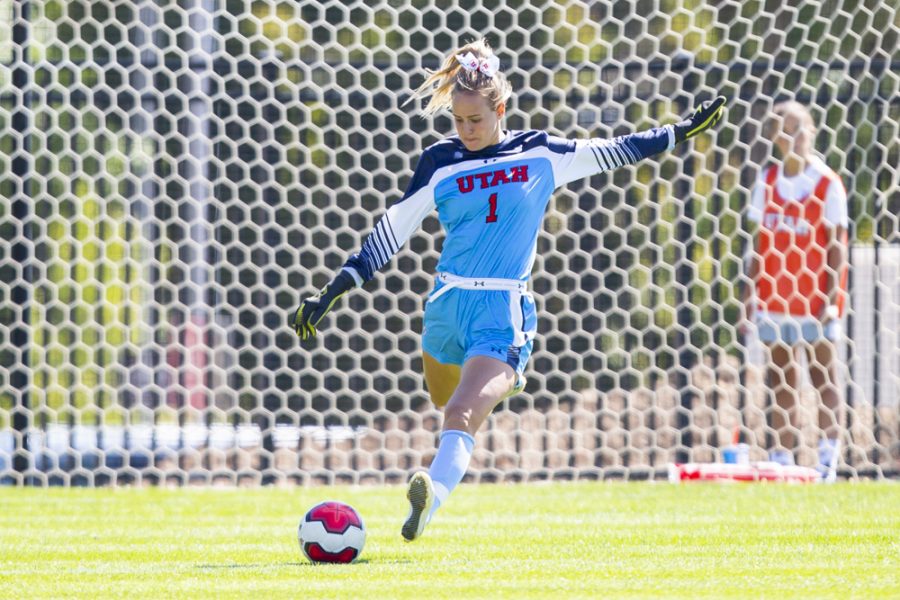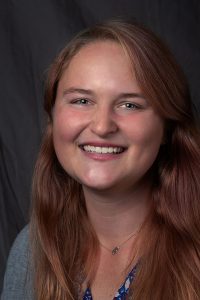Teammates Through it All: A Coming Out Story
University of Utah senior goalkeeper Carly Nelson (1) passes the ball in an NCAA Women’s Soccer game vs. San Diego University at Ute Field in Salt Lake City, UT on Sunday September 22, 2019. (Photo by Curtis Lin | Daily Utah Chronicle)
October 3, 2019
The LGBTQ+ community has seen incredible leaps and bounds during the 21st century in terms of acceptance and knowledge of its community, and the progress has been, in most cases, positive. Of course, there are still instances in which members and allies are ridiculed, showing the need for further work.
Some aspects of our society are more open than others with this community while others have remained closed off or resistant, whether on purpose or on accident. The sports world is one of these areas in which the impact of the LGBTQ+ community has been minimal until now, but many athletes are beginning to feel comfortable in their own skin.
The University of Utah prides itself on being an inclusive and welcoming environment for all students. Carly Nelson and Makayla Christensen, members of the soccer team, have firsthand accounts on the truths behind this statement.
Nelson is a senior at the U, and she is heading into her final soccer season as one of the most feared goalies in the Pac-12 Conference. She has the most shutouts of any keeper in program history, and she received her first Pac-12 Goalkeeper of the Week award last week.
Nelson grew up in a small town in Utah, and this experience shaped her own coming out story.
“The first time I knew was in seventh grade and I started realizing I was different. I realized I was different than my friends because I realized that I didn’t relate to the conversations that they were having about boys. I was always weirdly best friends with girls, and I always wanted to hang out with them,” Nelson said. “I come from a small town and so that talk to same-sex relationships was not okay. I came out super young, and that was in Utah where everyone shares the same mindset. I struggled a lot in junior high and high school with bullying.”
It wasn’t until her freshman year of college that Nelson finally fully came out to her family and friends. Many of the responses that she received during this time were negative. A lot of the people closest to her were unsupportive of her lifestyle.
“When I came out to my parents, that was probably the hardest thing I had to do. They didn’t really understand and accept it, and we had a big falling out for about two years where we barely talked,” Nelson said. “They always loved and supported me, but just not in that way. I couldn’t talk about it and they were always trying to change me when we did talk. That experience was very hard because I love and look up to them and I really want to please them. I felt like I was letting them down even though I wasn’t.”
One of the biggest struggles for Nelson was making sure that those people who meant the most to her still understood that she was the same person before and after coming out.
Luckily, Nelson had the constant support of her two sisters during this whole process. She also shared that she used soccer as a release, and she left all of her problems and struggles on the sideline and used that frustration to work as hard as possible on the field. Her past experiences have shaped her into someone who is strong, resilient and proud of her sexuality.
Christensen is a sophomore forward from Idaho and was raised in The Church of Jesus Christ of Latter-day Saints. She shared that at this point, she has not officially come out to everyone, and only about half of her family knows that she is lesbian.
Christensen arrived on a Utah soccer team that already had been exposed to Nelson’s coming out, and so the support that she received was overwhelmingly positive.
“I think the culture here is absolutely amazing because there are so many types of people here that believe in so many different things,” Christensen said. “It’s a very positive and accepting place to be. Our beliefs don’t stop us from being friends.”
Christensen’s input on the LGBTQ+ community and how it impacts athletes in particular was one of support. She hopes that eventually more athletes will feel comfortable using their athletic platform to feel comfortable with themselves and come out to their teammates and those around them.
When asked who she looks up to both in the LGBTQ+ community and as an athlete, she had a very personal answer.
“I would definitely say I look up to Carly Nelson on my team because we both have similar experiences with backgrounds and we both have had to go through a lot of the same things,” Christensen said. “When I came here, I knew she was the only other gay person on the team, and as I got to know her, we have been able to share experiences and she has given me some great advice to use in my situation in a positive way. I am super super thankful that I have connected with her.”
Both Nelson and Christensen have been using their platforms as collegiate athletes in a positive way by sharing their stories whenever the opportunity presents itself. They have both struggled through some tricky situations, and they have seen both the positive and negative sides of living in a world where they are not fully accepted for who they are.
However, there are resources for everyone, and more and more people are coming forward to share their stories and help the next generation of LGBTQ+ youth. Everyone has advice to offer, and the community is welcoming to everyone who needs it.
“Take a big breath. It’s okay. We’ve all been there,” Nelson said. “It is a scary place to be in but I think you just have to beat the internal battle. The more patient, loving and kind that you can be, the better off you will be.”








